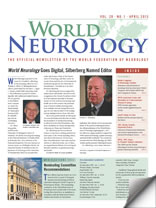The annual general meeting of the World Federation of Neurology (WFN) Council of Delegates was held Sept. 9, 2012, in Stockholm, during the 16th Congress of the European Federation of Neurological Societies (EFNS).
According to the constitution, WFN shall have at least one annual general meeting, the annual council of delegates, in the year between the world congresses. In 2010, it took place in Geneva, and in 2012, in Stockholm, both held at the annual EFNS meetings.
By tradition, the EFNS congresses are always in September. There were approximately 3,200 delegates who were welcomed to Stockholm.
Vladimir Hachinski, president of the World Federation of Neurology, greeted the delegates and introduced the main topics of the meeting — continuity and change. He also thanked the congress organizers and the president of the successful World Congress in November 2011 in Marrakesh, Morocco, El Mostafa El Alaoui Faris. This was the first World Congress of Neurology held in Africa.
Vice President Werner Hacke reported on the Congress Organizing Committee, and the plans for the 2015 Congress, which will be held in Santiago, Chile. Secretary-Treasurer General Raad Shakir delivered the financial report of the 2011 accounts, which revealed that the organization is doing well financially, and the auditors were reappointed.
Trustee candidates Stanley Fahn (U.S.), Wolfgang Grisold (Austria), Raul Federico Pelli-Noble (Argentina) and Jean Schoenen (Belgium) presented their statements, which were published in World Neurology, June 2012, and Wolfgang Grisold was elected. This was the first occasion Skype was applied in WFN elections. Unfortunately, the Skype function was less optimal than it deserved, and may need better performances to become a permanent function at the election procedures.
The WFN Membership Committee met during the congress, and WFN has 114 national neurological societies as members (113+1). Being a chapter in the organization of ILAE does not in itself serve as a sufficient criterion for a national neurology representation. The Constitution and Bylaws Committee also met during the congress under its present chair, Professor Alastair Compston. The committee reviewed the WFN’s present constitution and also pointed out that being a U.K. charity organization, the London-based WFN office serves an important function of the organization.
The situation for neurologists in Africa was discussed by the WFN Membership Committee and at the COD. The number of specialists in neurology is lower in Africa than in the other WHO regions. The median number of neurologists per 100,000 population is extremely low in Africa — 0.03 versus 0.07 in Southeast Asia, 0.32 in the Eastern Mediterranean, 0.77 in the Western Pacific, 0.89 in the Americas and 4.84 in Europe. WHO has thus demonstrated a lack of trained neurologists in Africa.
The Africa Initiative Committee met during the congress, and there was agreement to increase the training of neurologists in Africa, and especially in Ghana and Tanzania, and establish a closer contact with the relevant medical schools. Neither country had a neurological society or was a member of the WFN. Both collaborated with ILAE, have major medical schools and facilities and were capable of supporting training programs.
